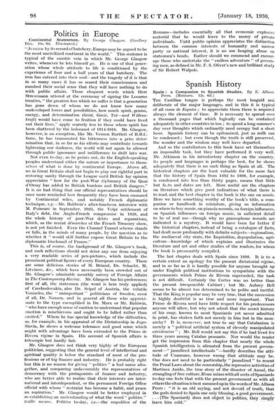Politics in Europe
"JUDGED by its record of butchery, Europe may be argued to be the most uncivilized continent in the world." This sentence is typical of the caustic vein in which Mr. George Glasgow writes, whenever he lets himself go. He is one of that gener- ation whose whole attitude to life is conditioned by the experience of four and a half years of that butchery. The iron has entered into their soul—and the tragedy of it is that in so many cases it has so seared their consciousness and numbed their social sense that they will have nothing to do with public affairs. Those eloquent words which Herr Stresemann uttered at the ceremony of signing the Locarno treaties, " the greatest loss which we suffer is that a generation has gone down of whom we do not know how many undeveloped forces and possibilities, how much spirit, genius, energy, and determination (Geist, Genie, Tat—und Willens- kraft) would have come to fruition if they could have lived out their lives," apply scarcely less to those whose spirit has been shattered by the holocaust of 1914-1918. Mr. Glasgow, however, is an exception, like Mr. Vernon Bartlett of B.B.C. fame, he has transmuted his bitterness into a grim deter- mination that, in so far as his efforts may contribute towards lightening our darkness, the world will not again be allowed through public ignorance and indifference to drift into war.
Not even to-day, as he points out, do the English-speaking peoples understand either the nature or importance to them- selves of what is done by continental Europe. Above all, we in Great Britain shall not begin to play our rightful part in restoring sanity through the League until British lay opinion appreciates " how far the post-War diplomacy of the Quai d'Orsay has added to British burdens and British dangers." It is no bad thing that our official representatives should be once more reminded how frequently they have been ensnared by Continental wiles, and notably French diplomatic technique, e.g.—Mr. Baldwin's after-luncheon interview with M. Poineare in September, 1923, the Volpi settlement of Italy's debt, the Anglo-French compromise in 1928, and the whole history of post-War debts and reparations, which, as the recent demarches of the French Treasury show, is not yet finished. Even the Channel Tunnel scheme stands or falls, in the minds of many people, by the question as to whether it " would still further expose Great Britain to the diplomatic blackmail of France."
This is, of course, the background of Mr. Glasgow's book, and such reflections should not deter any one from enjoying a very readable series of pen-pictures, which include the prominent political figures of every European country. There are some delicious stories of M. Briand, Dr. Schacht, M. Litvinov, &c., which have necessarily been crowded out of Mr. Glasgow's admirable monthly survey of Foreign Affairs in The Contemporary Review. Mr. Glasgow has his preferences; first of all, the statesmen (the word is here truly applied) of Czechoslovakia, also Dr. Seipel of Austria, the volatile Venizelos, the " unimportant " politicians of Sweden, most of all, Dr. Nansen, and in general all those who approxi- mate to the type exemplified in Dr. Marx or Mr. Baldwin, " who have enough sense of caution to understand that popular emotion is mischievous and ought to be lulled rather than .excited." Where he has special knowledge of the difficulties, as, for example, in his appraisal of the Dictatorship in Jugo- Slavia, he shows a welcome tolerance and good sense which might with advantage have been extended to the Primo de Rivera regime in Spain. His account of Spanish affairs is telescopic but hardly fair.
Mr. Glasgow does not think very highly of the European politician, suggesting that the general level of intellectual and spiritual quality is below the standard of most of the pro- fessions or of big finance and industry. He is probably right but this is no reason for giving " politics " a bad name alto- gether, and comparing unfavourably the representatives of democracy with the protagonists of finance and industry, who are better able to realize that their interests are inter- national and interdependent, or the permanent Foreign Office official with whom " restraint has become a habit, and peace an aspiration." Mr. Glasgow would be better employed in .re-establishing an understanding of what the word politics 7 really means. Politics to-day, i.e.—the respublica of the Romans—includes essentially all that economic explosive material that he would leave to the mercy of private individuals. Until public opinion appreciates the distinction between the common interests of humanity and narrow party or national interest, it is no use heaping abuse on statesmen's heads. Rather should we commend and encour- age those who undertake the " endless adventure " of govern- ing men, as defined in Mr. F. S. Oliver's new and brilliant study of Sir Robert Walpole.






































 Previous page
Previous page